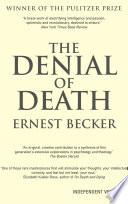Quotes from book
The Denial of Death

The Denial of Death is a 1973 work of psychology and philosophy by the cultural anthropologist Ernest Becker, in which the author builds on the works of Søren Kierkegaard, Sigmund Freud, Norman O. Brown and Otto Rank. It was awarded the Pulitzer Prize for General Non-Fiction in 1974, two months after the author's death.

“Mother nature is a brutal, red in tooth and claw, who destroys what she creates.”
The Denial of Death (1973)

“People create the reality they need in order to discover themselves.”
"The Spell Cast by Persons—The Nexus of Unfreedom", p. 158
The Denial of Death (1973)

“What does it mean to be a self-conscious animal?”
The idea is ludicrous, if it is not monstrous. It means to know that one is food for worms. The idea is ludicrous, if it is not monstrous. It means to know that one is food for worms. This is the terror: to I have emerged from nothing, to have a name, consciousness of self, deep inner feelings, an excruciating inner yearning for life and self-expression—and with all this yet to die. It seems like a hoax, which is why one type of cultural man rebels openly against the idea of God. What kind of deity would, create such complex, and fancy worm food?
"The Psychoanalyst Kierkegaard", p. 87
The Denial of Death (1973)

We called one’s life style a vital lie, and now we can understand better why we said it was vital: it is a necessary and basic dishonesty about oneself and one’s whole situation. This revelation is what the Freudian revolution in thought really ends up in and is the basic reason that we still strain against Freud We don’t want to admit that we arerevelation is what the Freudian revolution in thought really ends up in and is the basic reason that we still strain against Freud. We don’t want to admit that we are fundamentally dishonest about reality, that we do not really control our own lives. We don’t want to admit that we do not stand alone, that we always rely on something that transcends us, some system of ideas and powers in which we are embedded and which support us. This power is not always obvious. It need not be overtly a god or openly a stronger person, but it can be the power of an all-absorbing activity, a passion, a dedication to a game, a way of life, that like a comfortable web keeps a person buoyed up and ignorant of himself, of the fact that he does not rest on his own center. All of us are driven to be supported in a self-forgetful way, ignorant of what energies we really draw on, of the kind of lie we have fashioned in order to live securely and serenely. Augustine was a master analyst of this, as were Kierkegaard, Scheler, and Tillich in our day. They saw that man could strut and boast all he wanted, but that he really drew his “courage to be” from a god, a string of sexual conquests, a Big Brother, a flag, the proletariat, and the fetish of money and the size of a bank balance.
Human Character as a Vital Lie
The Denial of Death (1973)